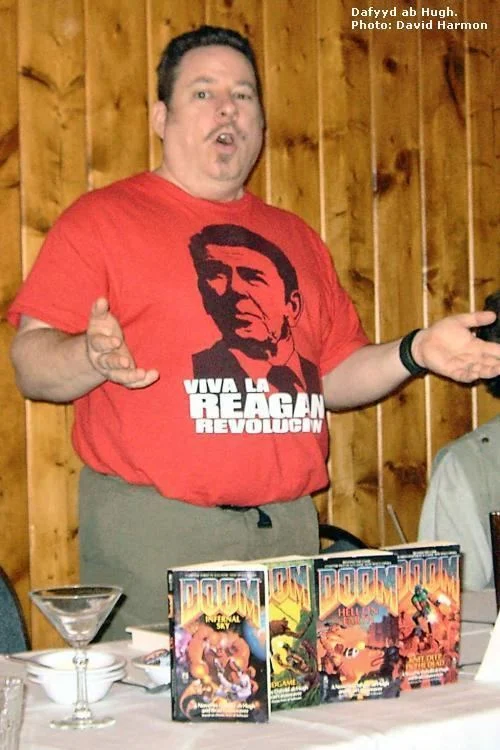They just don't think em like they used ta!
Dedicated with lust to Camille Paglia, who smokes the same cigars as Fred Olen Ray
—Dafydd ab Hugh in the dedication of Doom: Hell on Earth
So in addition to reading John Romero's auto-biography and replaying all official Doom and Doom 2 content, I decided to checkout the four Doom novelizations by one Dafydd ab Hugh. And, yeah, coming off the back of the first one, this was a gonzo reading experience. It’s not a demonstration of expert writing ability or anything like that, but it does do something kind of fascinating with the way ab Hugh is telling an immersive story from the perspective of a character within the UAC base, but sometimes describes it as it literally appears to players of the game and how it would appear without the abstraction as a person within the world. It almost has a verve about it that is kind of giddy, ragged-on-fumes quality which is edgy in a cool way, but the serviceable plot about getting my god damn (not) girlfriend back!! keeps the reading experience grounded in camp
But like… look at this weird part where there’s maybe a bit of institutional critique about the relation between military and commercial spaces:
"I was indeed at the nuclear plant level; above me was the hanger, while still below was the Toxin Refinery–didn’t that sound appetizing–Command & Control, the labs, Central Processing, and MIS. Jesus… only six more levels to clear; I was afraid it would be thirty! Funny how what I was seeing triggered memories of malls and shoppers. Best not to dwell on that…"
It’s surprising and both obvious you’d find something like this written in a 1995 novelization of a storyless videogame. It’s basically the thesis of that one video by the boring pop game studies scholar youtube essayist Jacob Geller which goes into why schools these days are designed like FPS levels. I’m serious that a lot of game studies people have talked to themselves into basically making it impossible to see games in the same naive but honest light that people whose first games were those made in the 80s and 90s, where a higher degree of abstraction was accepted in representation and mechanics because realism was too expensive or impossible.
Basically, Jacob Geller should have saved himself the time and read DOOM instead.
It’s just as good to go back to the old games as it is to watch early 20th century film and see what people without any impression of the possibilities of the medium were doing with cameras and editing. I am hopeful that these Doom books may offer a glimpse at how people used to look and think about games. I've only finished one, and yeah maybe my hopes are bit misplaced or at the very least a bit too high! But there is something really valuable, I think, to be glimpsed in taking abstractions literally. A good example of this in the realm of games is David Sudnow's monographa about his experience playing Breakout, which is called Pilgrim in the Microworld

Anyway I am debating if I should start the next DOOM book right now. The ending to the first had this bizarre moment where the spider mastermind tried to stop Flynn from killing him by flooding his perception with vivid images of (one of?) the most traumatic incident in his life. the event in question is one where him and his dad were at a big museum in Hawaii looking at a statue of king Kamehameha, and his dad turns to him and starts jumping up and down in place, screaming like Tarzan, and saying shit like ooh aah I am big chief Kamehameha. Like this action hero is confronted not with his shadowself, or his failures, but this embarassing moment when his dad was racist in public. He then laments how it was the most he has ever been ashamed of his father, but flips the switch and kills the spidermind regardless.
So yeah richly rewarding.
- Braden 11/28/23